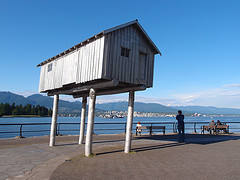As part of the Center for Climate Change Law’s efforts to continually improve its model municipal green building ordinance, CCCL has been tracking legal issues relevant to municipal green building ordinances. One major potential impediment to the successful implementation of a green building ordinance is preemption under federal law. While the preemption fears of green building proponents have yet to fully manifest, neither have they been fully dispelled by recent developments.
In 2008, the Air Conditioning, Heating and Refrigeration Institute (AHRI), a trade association, and other related plaintiffs challenged the City of Albuquerque’s recently established green building code before the U.S. District Court for the District of New Mexico. In the case, Air Conditioning, Heating and Refrigeration Institute v. City of Albuquerque (AHRI), AHRI argued that the code is preempted by the federal Energy Policy and Conservation Act and its amendments (EPCA), which regulates the energy efficiency of certain large appliances such as air conditioners and water heaters (42 U.S.C. § 6201, et seq). EPCA sets federal efficiency standards for these appliances and preempts more stringent state or municipal regulations to prevent a patchwork of state regulations.
In an October 2008 decision, the district court found that AHRI’s preemption claim had a substantial likelihood of success and granted a preliminary injunction preventing Albuquerque from implementing the code (AHRI, 2008 WL 5586316 (D.N.M. 2008)). This decision raised concerns: if AHRI’s preemption claim succeeded on the merits, many state and municipal regulations concerning energy efficiency of covered products, including most green building ordinances, could also be preempted. Indeed, Washington state’s newly enacted energy code has already been challenged on similar grounds.
Plaintiffs, seeking a permanent injunction, subsequently filed a motion for summary judgment. In a September 2010 ruling, the district court found the code’s prescriptive provisions preempted as a matter of law. However, it denied the motion with respect to the code’s performance-based provisions, including one based on the U.S. Green Building Council’s Leadership in Energy and Environmental Design (LEED) standards (AHRI, No. 08-633 (D.N.M. 2010), available at prior link).
In denying the summary judgment motion with respect to the performance-based provisions of the code, the court noted that AHRI did not meet its prima facie burden to show an absence of genuine issues of material fact. Noting that AHRI’s “cursory” argument presented “very few material facts,” the court held that AHRI did not show facts demonstrating that the code’s performance-based provisions are within EPCA’s preemptive scope. In particular, the court noted that EPCA regulates products, while LEED is a building regulation. Thus, AHRI was required to identify particular provisions within LEED that concern the energy efficiency of products covered by EPCA. Instead, AHRI supported its argument by relying on the court’s earlier preliminary injunction against the code’s performance-based provisions. The court rejected this reasoning because the legal standard for a preliminary injunction is distinct from that for summary judgment; reciting the court’s prior decision under a different legal standard is not relevant. The motion was denied without prejudice, leaving the opportunity for a renewed motion at a later date.
Because the plaintiffs did not meet their prima facie burden, the court did not reach the question of whether LEED or other performance-based standards are in fact preempted by EPCA. The motion was denied because the plaintiffs produced a shallow factual record; the court did not explicitly hold that LEED is not preempted by EPCA. Thus, these or other plaintiffs may yet renew a more detailed preemption argument against LEED-based ordinances. Until the merits of this issue are explicitly addressed, states and municipalities that have performance-based systems into their energy efficiency codes and ordinances should remain aware of possible preemption claims against their green building ordinances.
As of this writing, the preliminary injunction remains in force until the court determines whether the performance-based provisions in Albuquerque’s code are severable from the prescriptive provisions. If they are severable and plaintiffs do not renew their motion for summary judgment, the performance-based provisions in Albuquerque’s code could go into effect.




